Searsport LPG terminal misses first hurdle in planning board review
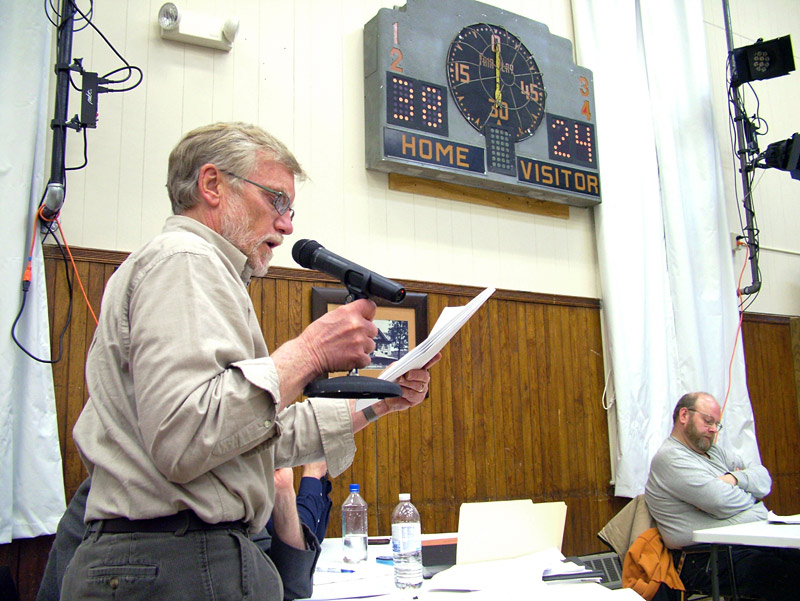 Colorado-based DCP Midstream fought a losing battle Wednesday night as representatives argued unsuccessfully to Searsport officials that the propane storage and distribution terminal they hope to build should be allowed to extend outside of the town's industrial zone. (Photo by Ethan Andrews)
Colorado-based DCP Midstream fought a losing battle Wednesday night as representatives argued unsuccessfully to Searsport officials that the propane storage and distribution terminal they hope to build should be allowed to extend outside of the town's industrial zone. (Photo by Ethan Andrews)
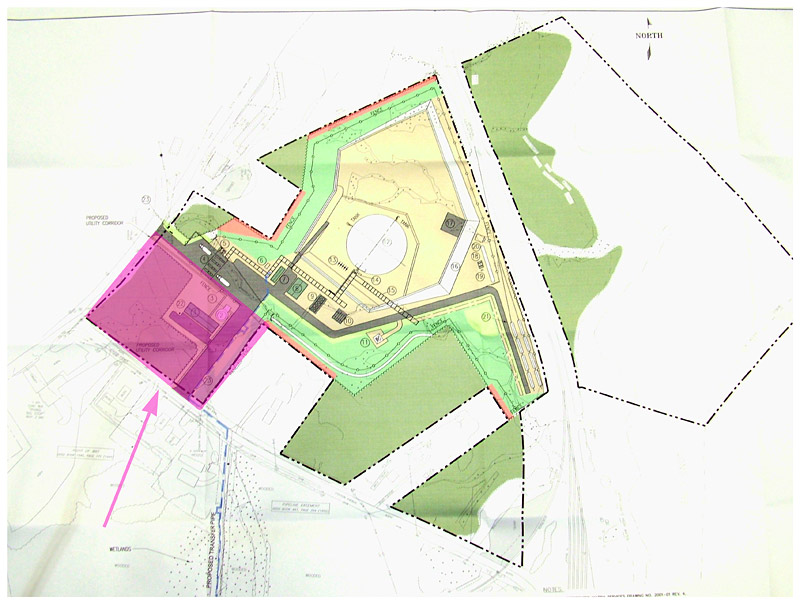 The Planning Board Wednesday rejected plans by DCP Midstream to use a spur of commercially-zoned land, shown in pink, as a connector to the company's proposed propane terminal, the bulk of which lies within an industrial zone. (Map courtesy of Town of Searsport)
The Planning Board Wednesday rejected plans by DCP Midstream to use a spur of commercially-zoned land, shown in pink, as a connector to the company's proposed propane terminal, the bulk of which lies within an industrial zone. (Map courtesy of Town of Searsport)
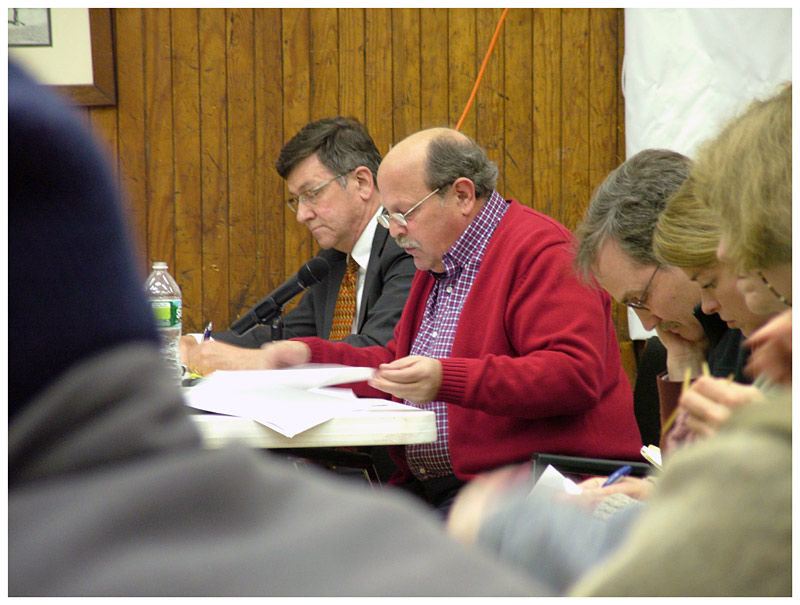 David Italiaander, center in red, testifies against the tank Wednesday night. Italiaander is flanked by attorneys Ed Bearor, left, and Steve Hinchman, right. (Photo by Ethan Andrews)
David Italiaander, center in red, testifies against the tank Wednesday night. Italiaander is flanked by attorneys Ed Bearor, left, and Steve Hinchman, right. (Photo by Ethan Andrews)
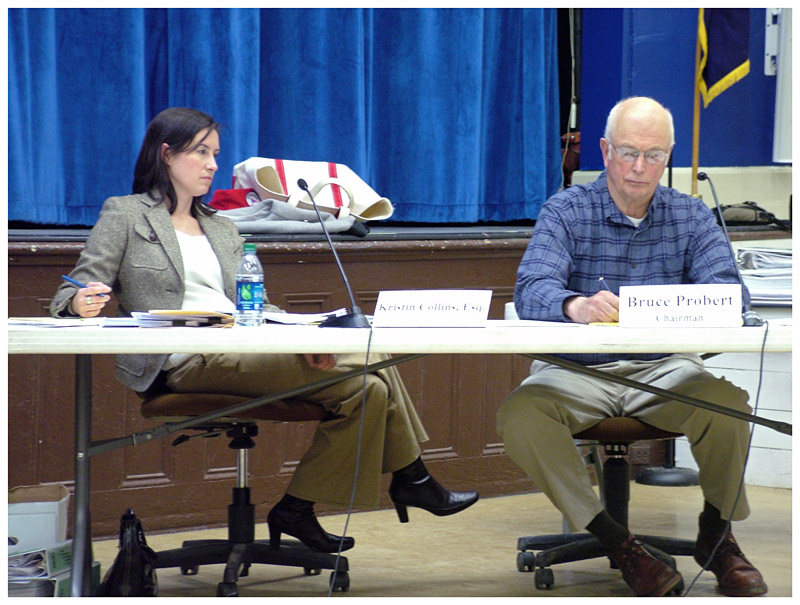 Searsport town attorney Kristin Collins and Planning Board Chairman Bruce Probert. (Photo by Ethan Andrews)
Searsport town attorney Kristin Collins and Planning Board Chairman Bruce Probert. (Photo by Ethan Andrews)
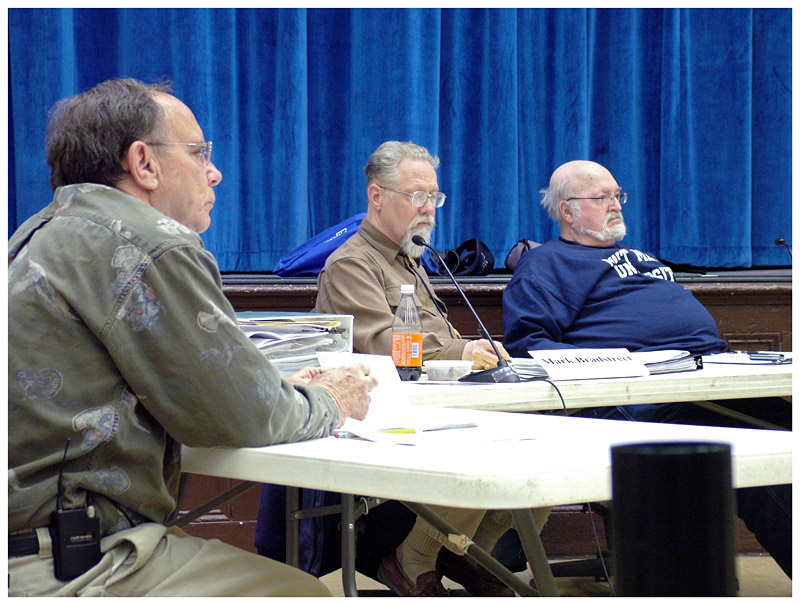 Searsport Planning Board members, from left, George Kerper, Mark Bradstreet and Brian Callahan. (Photo by Ethan Andrews)
Searsport Planning Board members, from left, George Kerper, Mark Bradstreet and Brian Callahan. (Photo by Ethan Andrews)
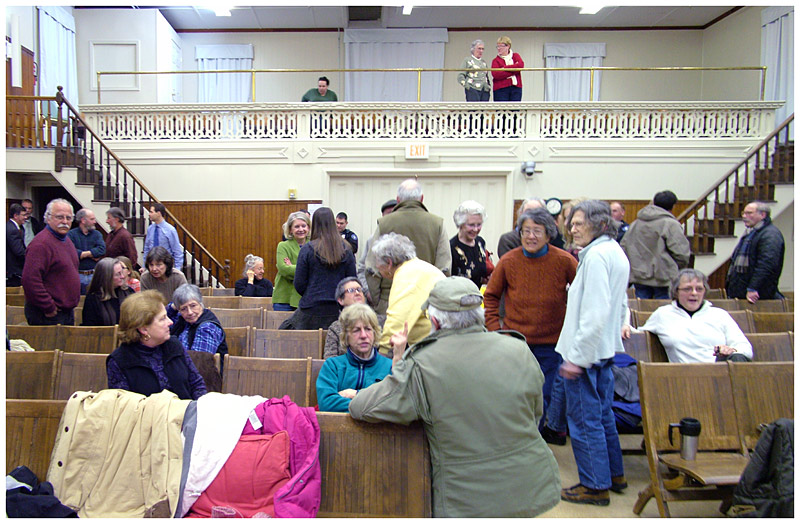 The audience in Searsport's Union Hall during a break in deliberations Wednesday night. (Photo by Ethan Andrews)
The audience in Searsport's Union Hall during a break in deliberations Wednesday night. (Photo by Ethan Andrews)
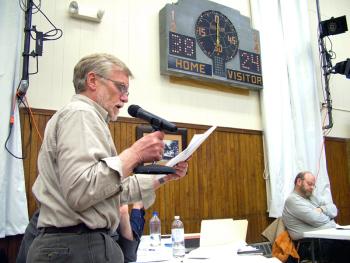 Colorado-based DCP Midstream fought a losing battle Wednesday night as representatives argued unsuccessfully to Searsport officials that the propane storage and distribution terminal they hope to build should be allowed to extend outside of the town's industrial zone. (Photo by Ethan Andrews)
Colorado-based DCP Midstream fought a losing battle Wednesday night as representatives argued unsuccessfully to Searsport officials that the propane storage and distribution terminal they hope to build should be allowed to extend outside of the town's industrial zone. (Photo by Ethan Andrews)
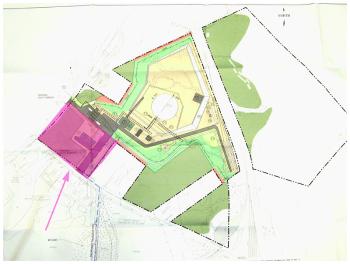 The Planning Board Wednesday rejected plans by DCP Midstream to use a spur of commercially-zoned land, shown in pink, as a connector to the company's proposed propane terminal, the bulk of which lies within an industrial zone. (Map courtesy of Town of Searsport)
The Planning Board Wednesday rejected plans by DCP Midstream to use a spur of commercially-zoned land, shown in pink, as a connector to the company's proposed propane terminal, the bulk of which lies within an industrial zone. (Map courtesy of Town of Searsport)
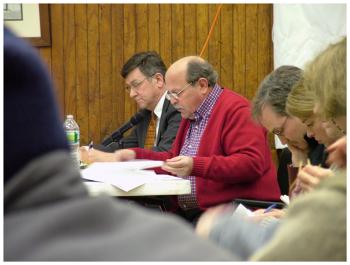 David Italiaander, center in red, testifies against the tank Wednesday night. Italiaander is flanked by attorneys Ed Bearor, left, and Steve Hinchman, right. (Photo by Ethan Andrews)
David Italiaander, center in red, testifies against the tank Wednesday night. Italiaander is flanked by attorneys Ed Bearor, left, and Steve Hinchman, right. (Photo by Ethan Andrews)
 Searsport town attorney Kristin Collins and Planning Board Chairman Bruce Probert. (Photo by Ethan Andrews)
Searsport town attorney Kristin Collins and Planning Board Chairman Bruce Probert. (Photo by Ethan Andrews)
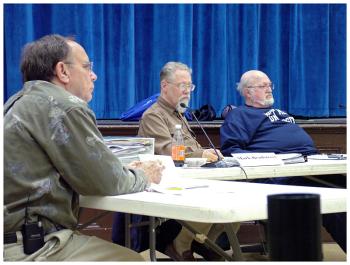 Searsport Planning Board members, from left, George Kerper, Mark Bradstreet and Brian Callahan. (Photo by Ethan Andrews)
Searsport Planning Board members, from left, George Kerper, Mark Bradstreet and Brian Callahan. (Photo by Ethan Andrews)
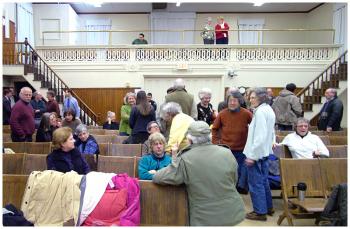 The audience in Searsport's Union Hall during a break in deliberations Wednesday night. (Photo by Ethan Andrews)
The audience in Searsport's Union Hall during a break in deliberations Wednesday night. (Photo by Ethan Andrews)
SEARSPORT - Jamie Kilbreth, attorney for DCP Midstream, was brief in his closing remarks to the planning board Wednesday night. The answers to many of the big questions about the propane terminal proposed by his client, he said, had been covered in reviews by state and federal agencies. Virtually everything else, he said, was spelled out in the town's ordinance for industrial zones.
"A bulk fuel distribution facility up to 150 feet high is a permitted use. Legally, that is the end of the discussion," he said.
The Achilles' heel of Kilbreth's argument proved to be a small area of the site that extends beyond the industrial zone into one designated for commercial development. Kilbreth argued that case law supported the exception, but the Planning Board disagreed, ultimately voting that the uses proposed for that part of the property were not permitted.
If the Planning Board were to be the final authority on DCP Mistream's proposed propane storage and distribution terminal — a project made both notable and controversial by its 22.7 million gallon storage tank — this would have spelled the end for the project. But as several board members conceded — and at least one attorney promised — the board's ruling will almost certainly be appealed, and could ultimately be decided in court.
The latter case has been given a dry run as the review of the propane terminal has proceeded more like a court case than a typical Planning Board review.
Speaking earlier in the week, Chairman Bruce Probert said the use of oral arguments, cross examinations, briefs and other legal conventions was mutually agreed upon at an early stage in the process by attorneys on all sides of the debate. In effect, he said, it made sense for the town to operate to a standard that would hold up in court.
The project was the subject of 11 public hearings between November and March, and though Wednesday marked the official beginning of the Planning Board's internal deliberations, the evening started with a final round of oral arguments from the developer and opponents. Both sides claimed the board's decision should be an easy one.
After making his point about zoning, Kilbreth called out two issues he saw as more open to interpretation.
On site plans, the portion of the site that extends into the adjacent commercial zone includes an access road, a small administrative office building, a fire water tank and pump, and an underground pipeline. Kilbreth argued that case law supports the services crossing a commercial or residential zone as accessories an industrial zone.
Kilbreth also took on the question of whether the tank would have an adverse effect on neighboring property values, saying that the outcomes were a function of the zoning.
"Anyone who has a lot adjacent to an industrial zone is going to be impacted by that zone," he said, adding that DCP's plans met the town's setback requirements.
David Italiaander, a resident of Searsport and opponent of the tank, argued that DCP's stated intent to use the Searsport terminal for importing propane was not only out of step with shifts in domestic markets toward exporting, but with changes the company has made at its own facilities and statements by company executives. Italiaander compared the limited market for importing propane to Maine with the exponentially larger profits to be had from exporting.
The import-export question has been a top concern recently among opponents who say reversing the flow of propane would substantially increase truck and ship traffic in the region, compounding concerns about safety, pollution and noise that many residents already have.
Ed Bearor, an attorney representing Angler's Restaurant and Bait's Motel owner Buddy Hall, called DCP's proposal "the wrong project in the wrong place." Hall's property abuts the proposed site of the propane terminal and his businesses would be a stone's throw from the tank.
"Four or five hundred feet from Route 1, four or five hundred feet behind a restaurant or a motel is not the right spot," he said. "Just because it's allowed, doesn't mean it's OK."
Bearor contended that the structures on the commercially-zoned land were not "accessory" but integral to the business in the industrial zone, and therefore should not be allowed.
Steve Hinchman, an attorney representing the citizen group Thanks But Not Tank and the Islesboro-based conservancy Islesboro Islands Trust, said the fight against the tank has been expensive and exhausting for opponents, but they have persisted because the stakes are high.
"They're in limbo; they're in hell," he said, describing how residents have put off improvements to their property and business owners have hesitated to make investments out of fear that they will lose out if the tank it built.
Hinchman echoed Bearor's statement that the spillover into the commercial zone was inappropriate and that a late amendment by DCP to move the facility's control room into the industrial zone was not enough. He touched on the import-export question, casting doubt on the viability of an import-only business, and segued into safety concerns by way of a double entendre on "bomb" — a failed business; an explosive.
Hinchman said DCPs application was so riddled with problems that it wouldn't withstand the randomness of a game of pin-the-tail-on-the-donkey.
"Blindfold yourself and stick a pin in your list of performance standards and they'll have violated it," he said.
The board took two votes on whether DCP's proposal conforms to permitted uses for the zones and found that the portion of the terminal located within the industrial zone did.
In a second vote, however, the board ruled that the uses on the commercially-zoned spur connecting the industrial lot to Depot Avenue were an integral part of the industrial plant and not accessories.
Board member Brian Callahan cited three reasons he believed the plans for this portion of the property did not constitute a permitted use. When DCP relocated it's terminal control room from the commercially-zoned administrative building to the industrial part of the property, he said, the company categorized the new location as protected sensitive security information. Callahan said other facilities had been open about the locations of their control rooms. As such, he took DCP's secrecy as a sign that the company did not intend to relocate the control room.
Additionally, he said the access road, office building, pipeline, fire water tank and pump were not ancillary but essential, and that the "office" was not in the spirit of offices described in the town's land use ordinance. The rest of the board agreed, voting unanimously that those portions were not permitted uses in the commercial zone.
Speaking after the meeting, Probert said at this stage in the process the issues in the commercial zone may not be amended, meaning the application could not be approved. However, he said, the board has to go through the full review in anticipation of an appeal.
Planning Board deliberations on the DCP Midstream application continue tonight. Meetings scheduled for April 10 and 11 have been cancelled. Make-up meeting will be held on April 17 and 18, and beyond if necessary. All meetings start at 6:30 p.m. at Union Hall, 1 Union Street, Searsport.
Ethan Andrews can be reached at news@penbaypilot.com
Event Date
Address
United States

































